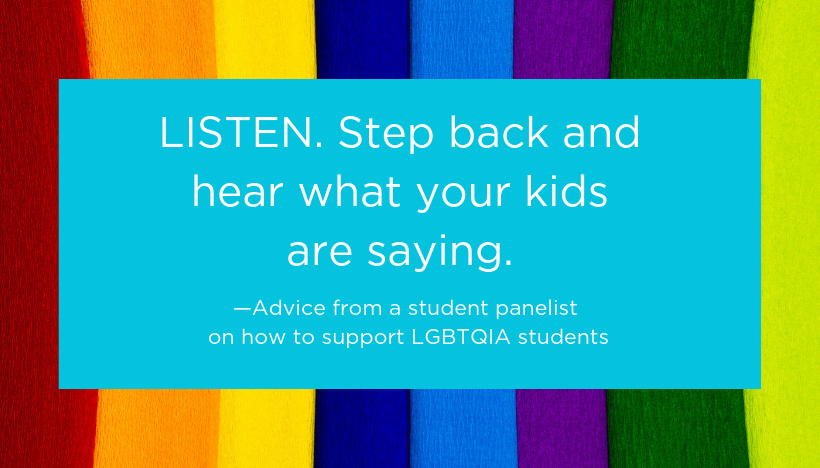From the NCTE LGBTQ Advisory Committee
This blog post was written by Dana Stachowiak, a member of the NCTE LGBTQ Advisory Committee.
On June 8, I had the honor of participating in an EdCamp for Equity and Inclusivity and the HiTOPS New Jersey Trans Youth Forum with two of my dearest literacy friends and NCTEers, Justin Dolicmoscolo (@jdolci) and Courtney Ferrell (@EduCourts).
This entire day was beyond amazing. Equity-minded educators engaged in critical conversations about privilege, oppression, and equity; trans and gender-variant youth and their families and friends participated in supportive and affirming workshops, all the while, mingling throughout the vendors, food tables, interactive displays, special panels, and keynote speakers.
But the most transformational part of the day for me was a student panel where middle school and high school students spoke openly and astutely about the ways in which educators can and should support LGBTQIA students. I found myself nodding in agreement, feeling overjoyed, sobbing, and being absolutely blown away by the profound, moving, and downright amazing advice they had for educators.
When I was asked to write an LGBTQIA-themed piece for this blog, I originally thought I would write about how educators can support trans and gender-variant students in their literacy classrooms. I identify as nonbinary genderqueer, and I have researched and written on this topic quite a bit (check out this narrative and this four-part series of classroom tips ). But after hearing from the students on the panel, I realized that what they have to say about what educators can do to support LGBTQIA students is far more important and powerful than what I have to say.
An overarching comment from the students on the panel was that LGBTQIA topics should not just be addressed in a unit or a book or a piece of the curriculum; instead, they should be woven throughout every part of the school experience.
Given this, it also seemed useless to write a typical blog post that offered examples of LGBTQIA literacy lessons or books. For this blog, then, I will follow the advice of one of the student panelists: “LISTEN. Step back and hear what your kids are saying.”
Here I offer you ways you can support LGBTQIA students in your classrooms—driven by the students themselves. There were three themes stood out from the panelists’ advice:
- Teachers need education too.
- Teachers have power and need to do the work.
- LGBTQIA topics should be the norm.
Teachers Need Education
One student, Rashad, very matter-of-factly said, “Teachers should be taught about LGBTQIA topics before they even have their own classrooms.”
As educators, we know quite well that equity topics, especially LGBTQIA topics, are not taught, or are loosely taught, in teacher prep programs, and professional development in schools is not much different. So, what can teachers do to educate themselves?
- Learn the history of the LGBTQIA movements. Do you know the significance of the Stonewall Inn in New York City?
- Get to know who makes up the LGBTQIA community. Do you know who Sylvia Rivera is? What about Edie Windsor? Harvey Milk? How about people in your own city?
- Understand the dynamics and needs of the LGBTQIA community. Did you know that most LGBTQ students feel unsafe at school because of their sexual orientation and/or gender expression?
The links provided are a good start for educating yourselves about the LGBTQIA community, and I encourage you to continue to dive deeper into related books, documentaries, and other websites that deepen your knowledge base.
Teachers Have Power (and Need to Do the Work)
“Teachers have so much power. And when you speak up, it brings so much legitimacy to our lives.”
This powerful comment from a young cisgender woman on the panel shook me. So often, as educators, we don’t think we have much power because the curriculum is often scripted for us, policies are seemingly difficult to change, and the culture of fear (of losing our jobs) is pervasive. But the fact is, we have so much power—and we need to use it. The panelists’ remarks around the power we hold as educators speak volumes about what we should be doing to use it to transform the landscape of education to be more equitable and inclusive. They remind us that:
- “We get that it [teaching or speaking up about LGBTQIA topics] can be hard or uncomfortable or dangerous for you; we are here asking you to not be afraid because we are already putting our lives on the line doing it. Be the teacher who keeps that student alive” (Michael).
- “Get out of the mindset of complicity—of being comfortable—in order to make things change. Be comfortable with not being comfortable” (Aamir).
- “If you want us to care about your class, show us you care about us” (Brooke).
- “People will listen more to people who are like them. So straight, cisgender teachers: stand up” (anonymous).
- “We could save a life if we just educated our kids” (sixth grader).
So, what are you going to do with your power?
LGBTQIA Topics Should Be the Norm
Finally, in addition to the previous two suggestions, students also called on educators to pursue continuing education about the LGBTQIA community and to make LGBTQIA topics the norm. One student, Jolie, asked, “Why is this work out of the rule book?”
What a question! Why is it that certain equity topics are discussed, and LGBTQIA topics seem to break the rules of critical equity conversations? If we say we want a more socially just education system, we can’t pick and choose which issues of social justice we amplify.
To this end, the students encouraged educators to:
- teach LGBTQIA topics throughout schooling, starting with elementary students,
- learn about LGBTQIA topics alongside their students, and
- include students in creating the curriculum (What a novel and equity-based thought— including the students. And this came from the mind and heart of a seventh grader!)
The more that educators can work to ensure that LGBTQIA topics are the norm, the safer our students feel, and the greater everyone’s opportunities for success. As Chloe, a high school student, reminded us, if we “incorporate [LGBTQIA topics] into the curriculum, then it becomes part of the [normal] environment.”
Go Forth and Serve!
Want more resources to support your education, help you use your power, and make LGBTQIA topics the norm in your literacy classrooms (and across curricula)?
Check out these sites:

Dana M. Stachowiak is an associate professor of curriculum and instruction at the University of North Carolina, Wilmington. She is the vice chair of NCTE’s Genders and Sexualities Equality Alliance Assembly in addition to being a member of the LGBTQ Advisory Committee. You can follow her on Twitter @DrStachowiak.

